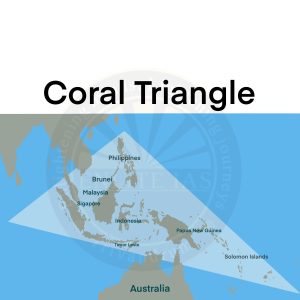Why in the news?
- The Philippines is preparing to host Southeast Asia’s first coral larvae cryobank which links research institutions in the Philippines, Taiwan, Indonesia, Malaysia, and Thailand to create a network of cryobanks across the Coral Triangle.
Coral Triangle
- What is it?: The Coral Triangle (CT) is a roughly triangular marine region in the tropical waters spanning parts of Indonesia, Malaysia, the Philippines, Papua New Guinea, the Solomon Islands, and Timor-Leste.
- Location: It lies at the interface of the Indian and Pacific Oceans, encompassing diverse waters and coral reefs.
- Other Name: It is often called the “Amazon of the Seas” due to its staggering marine biodiversity.
- Biodiversity & Ecological Importance:
- Contains ~76% of the world’s coral species and ~37% of global reef fish species.
- Home to 6 of the 7 marine turtle species.
- Hosts the largest mangrove forests globally.
- Supports the livelihoods of around 120 million people through fishing, tourism, and coastal ecosystem services.
- Threats to the Coral Triangle:
- Climate change: Coral bleaching, ocean acidification, and rising sea temperatures.
- Overfishing and destructive fishing: Use of explosives, cyanide, and bottom trawling.
- Pollution and coastal development: Sedimentation, agricultural runoff, and industrial effluents.
- Oil and gas exploration: Fossil fuel activities threaten marine ecosystems.
- Noise pollution: From shipping and seismic surveys affecting marine life.
- Habitat fragmentation: Disrupts ecological connectivity.

